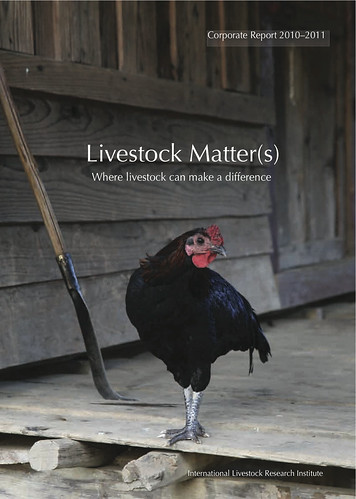Cover of ILRI’s Corporate Report for 2010-11 (cover picture credit: ILRI/Stevie Mann).
Positioned as we are now, squarely between a scientific ‘Planet Under Pressure’ conference held in London in March and a ‘Rio+20 Sustainable Development’ conference in Brazil this June, it seems an appropriate time to raise a topic that rarely gets raised at these large affairs, that is, why livestock matter so much to so many, why they will remain important in pro-poor development for years to come, and what we can do to make smallholder livestock development more profitable, healthy and sustainable.
The 2010–2011 corporate report of the International Livestock Research Institute (ILRI) provides a ‘big-picture’ overview of these topics.
If you haven’t seen it, we invite you to take look. As the foreword points out:
Whether your main interest is increasing food production, or sustaining farming systems, increasing the incomes of the poor, developing new global bread baskets, making better use of dryland resources, conserving biodiversity, slowing climate change, helping people cope with climate change, or enhancing human health and nutrition, you will find livestock issues critical to your concerns.
‘. . . In the developing world, livestock are the fastest- growing part of agriculture. They’re a ‘demand-pull’ that can drive small-scale agricultural systems—the motor that brings in cash to smallholder mixed crop- and-livestock farmers. While cereals sustain the family, farm animals are the family’s source of cash— its living ‘asset base’.
‘Due to population growth and other drivers of change, many of the developing world’s livestock systems are transforming as fast as they are growing. Science needs to help the world’s poorer livestock keepers make better and more sustainable use of the big changes and new trends. That’s where, and why, the role of livestock science is so critical. . . .’
A short introduction—’Livestock matter(s): The big picture gets bigger—and the following six two-page chapters tell (some of) the story.
Livestock sustain smallholder food production:
Smallholder livestock farming is a mainstay of the poor
Livestock products feed incomes as well as people:
Livestock value chains are valuable value chains
Livestock intensify mixed farm production:
Small-scale crop-livestock farmers will feed the growing world
Livestock make productive use of dryland resources:
Smart livestock-related support reduces pastoral vulnerability
Livestock influence climate change—for good and bad:
Smallholders can make their livestock production much more efficient and profitable
Livestock impact human health—for better and worse:
Animal matters are life and death matters for human health and nutrition
Check it out: ILRI Corporate Report 2010–2011. Livestock Matter(s): Where livestock can make a difference, Nairobi, Kenya: International Livestock Research Institute, 2012.

